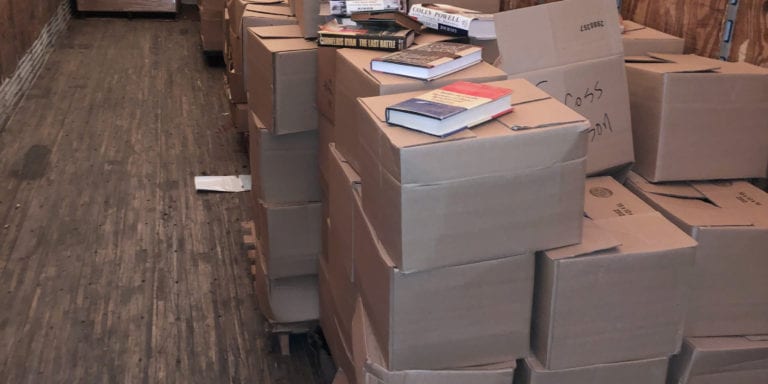
The Hottest Book Around—At One Time
There are a dozen old trailers backed up to loading docks here at the Wonder Book and Books By the Foot warehouse in Frederick Maryland. We bought them as salvage and use them for storage. We’ve filled up the 130,000 square foot warehouse. If we didn’t have those trailers—well, the books in them would have no place to go.
That is never good.
Each trailer is like a little annex, an appendage sticking out from the building. To access them, we just push a button, and the dock door goes up.
There are 21 loading docks at the former US Post Office Distribution Center which became our warehouse in 2014. We certainly don’t need that many!

Dock 1 and Dock 2 are “low docks.” These are at the level for unloading from vans and other vehicles that back up here to drop off (or take away) books.
Dock 3 is an “elevator” dock. It has a platform which can rise and descend from ground level. If we want to take the forklift or other equipment out to the dockyard that is the only way to get big stuff from the building to the ground.
Dock 4 and Dock 21 have corrugated paper crushers and large metal containers attached to them. We can quickly crush the thousands of boxes we get in every week if they can’t be repurposed for our own use. The crusher pushes the cardboard into the containers. When the containers are full, we summon a recycler who brings an empty container and takes away the full one.
Dock 5 is where a different recycler’s trailer is parked. Into it we roll pallets of scrap paper and plastic as well as sorted books. The recycler pulps the paper, sells off the plastic and resells the books (I think in bulk overseas.) When we fill the trailer, we summon that recycler. They bring an empty trailer down and take the full one away.
Docks 6, 7, 11, 17 and 20 are HIGH docks. These are about 5 feet from ground level. We use these for deliveries and shipments of books in big trucks or tractor-trailers.
The other 10 high docks have trailers backed up to them. We bought these salvaged trailers from brokers. The brokers guaranteed they are dry and safe. They are just too worn for continued road use.
21 loading docks…crazy… never in my wildest dreams…well, maybe THE wildest dreams…
The books we store in the trailers are not easily accessible, but we keep a list of what is in them taped to each loading dock door.
Sometimes we stick collections that are low priority in them. These collections may not be worth sorting through until we get a little desperate for books. This week I decided the hoarder’s collection that we had picked up last summer should be pulled from the trailer and triaged. I knew a lot of the books were very common and, therefore, not viable for internet sales. Many of the books had some condition problems or flaws that could be caught by an experienced sorter and not be sent to Data Entry only to be rejected and sent back.
(We also put some collections that need “airing” out to the trailers. The collection we bought a month or so ago that was lightly scented with mothballs is also in a trailer until all the odor dissipates.)
So, I asked Clif to pull out all the pallets labeled “Manchester” out of the trailer at Dock 15 and take them up to sorting. That created about 30 empty spots for us to fill with pallets. I wandered past the open dock door later. He had pulled out the hoard. I decided to wander in.
The pallets of books that were left in there are also labeled. The pallets have a sheet of paper taped to them which read “Chevy Chase Musty.” Chevy Chase usually means good books. There is a lot of money and many old estates in Chevy Chase and Bethesda Maryland. This collection came out of a damp basement. They were “resting” in the trailers until their odor dissipated.
I glanced over as I walked past, and atop the boxes were some loose books. Among the loose books I saw a title that took me back almost exactly 20 years.
“That was the hottest used book around for a while,” I recalled.
In 1998 internet bookselling was still primitive. Our web bookselling was still in its infancy. We had put our first few books on the World Wide Web in 1997. I had to be dragged to the technology kicking and screaming. The brick and mortars were doing great. We were renting VHS tapes like crazy. On weekend evenings we had lines at the counters. Books were booming. It was near the height of the Hypermodern phenomenon. First editions in perfect list jackets that were only a few years old were often commanding prices of $15 and up. Even recent bestsellers by hugely popular authors like Stephen King and Tom Clancy could command prices above their original retail. $35 for a 5-year-old Stephen King first printing that had hundreds of thousands of copies printed? Yep. And the demand outstripped supply.
The end of 1998 was dominated by the Impeachment Hearings and Senate Trial of a US President for the first time since 1868 when Andrew Johnson was impeached by the House of Representatives. The Senate trial presided over by Chief Justice of the Supreme Court of Salmon P Chase failed to convict Johnson by the 2/3 majority vote required.
Our experiment in internet bookselling was…just amazing… We were selling exotic titles for good money. Exotic titles for which there was no market in our Maryland bookstores. Of course, that got our attention, and although the stores were booming, we began pouring resources into mail order bookselling.
We began putting hundreds and then thousands of books onto early bookselling selling platforms like Bibliofind and ABE.
Back then just about anything that was unusual and out of print would sell.
“Chuck, there’s a call. She says she is the librarian for the Supreme Court.”
I was still working in the bookstore. My windowless office in the back of the Frederick store was like a bunker. It had two doors though. One led out to the sales floor. The other exited to the rear of the shopping center. Behind the building was a dark dreary drive that trucks could use to service our rear entries as well as the other stores in our center. It was also my bolt hole, my way to escape from work unnoticed by employees and customers. I learned that when I wanted to leave, if I tried to out through the store, someone would often stop me with a question or problem or to chat or to ask for a discount or…
I picked up the receiver on the wall-mounted phone and pushed the blinking light to connect with the caller.
She introduced herself and said: “I see you have 5 copies of Chief Justice Rehnquist’s Grand Inquests for sale on Bibliofind. Can you ship them to me with an invoice?”
“Sure.”
I got her number and called over to the tiny warehouse space we had recently rented for the internet stock and online shipping.
“Hey. Pull all 5 copies of Grand Inquests for me. I’ll tell you what to do when I get over there.”
I was called back in a little while.
“They all sold overnight. They just hadn’t been deleted yet.”
I called the Supreme Court back with bad news.
“Oh no! We can’t find any copies anywhere. Can you find any?”
“I’ll try.”
The fact that we had 5 new copies the day before told me it was almost certainly a remaindered book we had bought. We might have more copies in the stores. I assigned people to look at each store. I assumed, since the title was pretty academic, it had probably come from Powell’s in Chicago. I called them.
“They’re all sold, I’m afraid,” Gene told me.
The stores called me back with negative results as well.
The book was written by Supreme Court Chief Justice William Rehnquist. Rehnquist was also to preside over the trial of the President in the US Senate for High Crimes and Misdemeanors. The book had been published in 1992. Apparently, every copy in the world had quickly disappeared.
It was the hottest used book in America for that brief time.
No one knew what to expect. This book was just about the only popular title on impeachment published in recent years.
I called librarian back with the bad news.
“Can you do anything? One of the Justices REALLY wants a copy. We can’t find any anywhere.”
I thought: “It’s always possible there’s some here somewhere. That book could fit in a number of different categories.”
I exited my office and began searching my own store. The Frederick store has always been our flagship location. It opened in 1990. We have about 300,000 books there.
“Where would I stock that?”
Law? Presidents? 19th century history? Civil War?
I went out began scouring shelves in any possibly reasonable category.
Of course, this wouldn’t be a story if I hadn’t found a copy. My memories have faded as to exactly where in the store I found a copy. Likely it was misfiled or perhaps stuck on a top shelf in overstock since we had multiple copies at one point.
Our sticker price was $4.99.
The bad angel on my sinister shoulder whispered:” You should raise the price! You went to a lot of trouble to find this. You’re holding the only one!”
The good angel on right shoulder told me: “Don’t be a jerk.”
Maybe both voices were my Book Muse tempting and scolding me in two distinct voices.
I called back. The librarian was elated.
I asked: “Can you tell me which Justice needed this?”
“No. I’m sorry.”
“Oh. Ok. It would be cool to have a memento or something. We had a lot of people looking for that book. This has been a pretty memorable day for us.”
We overnighted the book.
A week or so later, a large manila envelope arrived in the mail to me attention. The return address printed upon it was: “The Supreme Court of the United States.”
When I opened it, there was an autographed photo of Justice …
Well, I was sworn to secrecy, and I’ve always been pretty good at keeping secrets.
It was an exciting and worrisome time. If you think the country is divided today, well, everyone everywhere was polarized then. Maybe it is always the best and worst of times.
I followed the impeachment mostly in the printed copy of The Washington Post which was tossed onto my driveway every morning as well as on CBS, NBC, ABC and CNN. I now had an additional reason to be especially interested. Wonder Book was a tiny bit of history in my extrapolated vision.
Which Justice signed a photo for me?
A secret is a secret.
You guess:
The 1998 trial had the same results as the 1868 trial.
Here’s a 1993 review of the book from The American Journal of Legal History.
The next two stories took place in the late 1990s. They were written in the early 2000s.
A Summer Auction
Most auctions were set in uninspiring locations. Most auctioneers preferred to remove an estate’s contents to their own facilities. Professional auction venues are Spartan affairs. Sometimes, if the estate was large enough and nice enough, they would hold the sale on the home site. This saved the labor of hauling, and if the home was in a particularly prestigious neighborhood, that pedigree could help to significantly raise the prices realized.
It was early summer. Kind of late for the auction season. The house was a big wooden Victorian Lady with sweeping verandahs and loads of carved, routed and turned architectural details. It was located in the small, fashionable hamlet Braddock Heights overlooking two valleys. The sale was held in the backyard.
The yard was lined with deep perennial and herbaceous borders. I wished there were a way to buy the flowers. I could dig them up and put them in some of the spare book boxes I’d brought with me. Blue Hostas clustered around the feet of Harry Lauder’s Walking Sticks and dwarf Japanese maples. Peonies, their blooms spent, ran their waxy green fronds between the higher shrubs. Balloon flowers shot their perfect blue heads up through day-lily clumps. Baby’s breath spread its spidery gracefulness between clusters of lavender with their eponymous flower stalks bobbing in the slightest breeze at the very front of the border. The border itself was defined by randomly cut limestone blocks set as a miniature wall. Forming a background for the rear of beds were ancient tall lilacs and clematis, their vines trained up tall white fan-shaped trellises. At the back of the yard were five huge blueberry bushes, their fruit just beginning to ripen. Soon, man and bird would compete for the sweetest blue-black spheres. Below the side verandah large groups of regal and symmetrical ostrich ferns rose and arched up and out like miniature green geysers.
The “smalls,” which is auctioneer terminology for general assorted household contents, were set out on the backyard lawn in rows of boxes running perpendicular to the home. The books were interspersed with these. The furniture and larger pieces were up on the verandahs or porches.
It was hot, but not sizzling. Just a gentle bake. The grass was close cropped. Bees and white cabbage moths gave sound and motion to the nearly still scene before the auction action started.
The books were good. For nearly eighty years the same family had occupied this house. They had money and good taste. There were a number of leather-bound sets like Kipling and Maupassant and Carlyle. Lots of other leather too. Most were in good shape without the cracking and powdery leather rot which so many leather-bound books fall victim to. There were numerous old cloth sets too. Irving’s Life of Washington, Booth Tarkington, Balzac, Jules Verne and many others. The decorators would love this stuff. They’d pay for it too. Some would go to collectors. A few to actual readers. The loose books were also intriguing. I hadn’t the time or inclination to mine through each box, but my surveys showed promising veins of gold and occasional jewels. I would set my eye on everything. I would lay the groundwork for getting them all with some pre-emptory bidding. I would go as high as it took in order to intimidate and scare off the competition. That was the plan anyway. Unfortunately, the auctioneer was not cooperative. The books would be sold throughout the day, so I was going to be stuck there for the duration.
My bidding strategy seemed to work, however. I got nearly every lot I wanted. As soon as it was knocked down to me, I would pull, stack and consolidate the boxes off in a corner of the yard. I kept them away from other people’s piles.
When my books were safely segregated, I quickly rejoined the fray; following the cluster of bidders and nosy hangers on surrounding the auctioneer down the line of boxes.
When they needed a break, the auctioneers switched off. One good-natured hustler would unsling the loudspeaker from their shoulder and hand it and the microphone to the next fast talker. The sale never ceased. I kept shouldering my way to the center of the crowd so I could see exactly what the auctioneer was pointing at on the ground. If I couldn’t see, I worried the best lots would come up as soon as I stepped out of the fray. Or I might end up blind bidding on a box of plates or pots and pans. I’d be embarrassed if they got knocked down to me.
“Sold to number 98. Hey, Book Guy, are you expanding into kitchenware?”
Haha.
And I would also keep half an eye on the boxes I’d dragged off. It was not at all unusual or uncommon for my fellow dealers (usually the fringe flea market and “antique” dealers) to pilfer from unprotected buys.
“Oh, I thought this was my lot. Sorry.”
Around two p.m. a rather strong breeze rose up. The flower heads began swaying or bouncing. Soon after, the sky began to darken.
The auctioneer picked up his pace. He would no longer drag out the bidding trying to milk some extra dollars from the rubes who let their ego defy their common sense and overbid on boxes of absolute junk just because they didn’t like the looks of the character that they were bidding against (like me for instance.)
There was a distant rumble. The auctioneer began selling groups of boxes. Sometimes ten at once. He would take two or three bids before saying: “Sold! To number…” as soon as he sensed any hesitancy from the crowd.
The wise ones among us dropped out and began loading frantically.
A boom. Then a hiss as the rain moved across the lawn in a nearly straight line.
The auctioneer sold what remained in the last row, about sixty boxes of assorted stuff for twenty-five dollars.
To me.
I looked around me trying to remember which were the best boxes and swung into action. I hefted three boxes at once and trotted to the van. I moved the van as close as I could to the backyard. I pulled out the two-wheeled hand truck and rolled it into the most promising boxes. The storm was picking up. Large drops hit my forearms, briefly pooled and then ran down.
The water spot mosaic on each box lid was getting denser and denser.
Each load I took to the van I slung in as far as I could disregarding any kind of proper packing procedures.
More rumbles and the intensity turned up another notch. In between trips I glanced around to see if there was anyone I could enlist to help. I’d pay. No such luck.
Some of the boxes were softening now. I quickly surveyed my remaining piles throughout the yard. I tried to determine which boxes to save and which would have to be abandoned to the elements.
Like a fireman in a burning house with too little time to rescue all the victims, I made life and death decisions for the books which had withstood the test of time until my greed and foolishness put them at risk. The rain was cascading down now. Gusts of wind would whip up torrents of increased intensity into my face, eyes and boxes. I was drenched through now. Some boxes sagged to pieces with the stress of lifting them. Their beautiful contents would spill to the ground and spots like an incredibly rapid disease would pock their covers as rain pelted and then was absorbed by them.
I crammed all my books in the van. I suppose I risked my life for books with the electricity crackling in the atmosphere around me.
Hey. Books are books.
Boxes whose contents I felt sure were dead, I took nevertheless. Hoping that there may be some inner middle tomes that somehow survived and could be resuscitated.
I tore off to the warehouse and enlisted the four people on duty there to unload and spread the victims out on the floor. Eldon, a buyer and researcher, and I performed triage. We directed which boxes should be attended to first. Blankets and bedspreads which usually were used for protecting fragile objects during transport were brought up and used as towels. Cases of paper towels, intended for store use in our public washrooms, were broken open and generously used to daub the books whose bindings might yet be saved.
A few hours later we caught our breath and surveyed the disaster scene.
Those books that were too far-gone were shoved over to a morgue area among the empty and soggy boxes. The dry books were stacked neatly off to one side.
The remaining ones which would need time or further care were left to lay singly on their boards with our hopes that they would survive. We hoped maybe their pages would not stick together. We hoped that their boards would not warp and curl. We hoped that the binding would not swell with the water which filled them. We hoped the water stains would fade as they dried and not leave permanent spotty scars.
All in all, we did pretty well. Financially, we did very. Very well. But like any good shepherd, you regret greatly the lost lambs, although you saved ninety-five percent of the flock.
A Panoply
I don’t think I’d ever heard the word “panoply” in conversation before. Panoply was a word from long dead times. Panoply had royal connotations. Medieval. Knights and princesses, ceremonies and spectacle.
Astrid Holmgren had lived in her family’s manor house for eighty-seven years. Her connection to another world was strong. The Old World of Europe and historic world of early 20th century America.
Her bright bird-like eyes and high song-like voice indicated she was doing just fine in this world. I’m very business-like on most house calls. There is little time to smell the flowers. This became especially true as the years progressed and we got busier and busier; as more and more books poured in each year. Time is precious. Time accelerates as we age. Things like sleeping late and wasting time become distant vices. Time spent not doing business during business time meant less time for the family and friends and…stuff. Then there were more employees, more landlords, more checks to write, more forms to fill out, more fires to put out. Small talk meant it would be that much later until I could call it a day “well done.”
I’d been referred to this estate by my accountant. They’d handled the family finances for decades.
When I drove into Astrid’s drive, I knew this would be a different call. She had described some interesting books, and I looked forward to this kind of house call as an interesting and profitable break from the grind at the stores. It was yet another grand old country house. It seems history often begets history. There was a historic landmark plaque fixed to the wall by the door.
A paper note hung from the door:
“Please come in.”
I entered calling my name and business.
Her high singing voice summoned me:
“Yes, yes, back in this room.”
She was a bird. She must have been no more than five feet tall even before time had bent her. But that height would have been right for her times. If it wasn’t for the stair glide I had passed by and her aluminum walker and the TV on the opened antique secretary, I could easily have been in an Ingmar Bergman flashback (Oprah’s presence on the TV was certainly an anachronism here.) Almost everything else would fit very well in the late 19th century.
She was breaking the home down and her treasures. The treasures of three generations before her had to be condensed to the elder care apartment she was moving into.
Her language and diction were precise. Her era demanded proper grammar and speech from proper people. The high speed slurring we use now had no place in her presence. I semiconsciously slowed my speech down and carefully pronounced complete words. I remember my mother’s Alabama accent would only appear in the presence of another southerner. Just so, my proper English appeared in this home in the presence of the past. She lifted and pushed her walker ahead of her. Singing stories to me.
“Do you know what this is?” She pointed to an ornately carved sheet music bureau. “This was my great grandfather’s. He brought this from Sweden when he moved here with his new wife. She was an opera singer, and he was first violin.”
This was going to be an involved visit, but I didn’t mind. I felt time giving way, and I felt myself slipping into a state of mind long ago and far away.
She had separated many of the books that she wanted to keep, but at each shelf we inspected she would ask me to pull a few books off.
“Oh, no, no. That was given to my mother by Father. I mustn’t sell that one.”
Each room was full of precious objects. Many objects seemed to call out to her to “tell my story.”
I’m always drawn to book shaped objects. It can be a bronze statue of a girl reading a book or bookends in the form of a small pile of books. I’m attracted to prints or paintings about books. Like a statue erected to honor a man, the artistic representation of a book honors the idea and the fact of books. I desire these items. I saw some on some built-in shelves amongst the bric-a-brac.
I desired these. When I was in strangers’ homes, sometimes I felt like I was crossing the line when I asked about non-book items. I have little expertise with antiques. I know what I like and I have some instinct, but obviously my interest is not based on an informed appraisal. My only safe approach was the honest:
“Do you have any interest in parting with this?”
If the answer is affirmative, I can follow:
“Do you know what you want for them?”
If it’s not for sale or some incredibly high value is stated, I could express my appreciation of the item and move on. Astrid would have none of this.
“Do you like this?” she sang. “Do you know what it is?”
I knew. The “book safe” in question consisted of five 18th century books in lovely tooled decorated leather bindings stacked neatly upon each other. The top two books were attached by a leather hinge and would tilt back to reveal—something. The bottom three books would serve as a base. The whole thing would be hollowed out inside and would hold “something.” Maybe just a void to hold secret papers or letters or maybe something more exotic. From any distance they looked like a small group of books. I gently lifted the top to reveal two crystal decanters. They were small and square, maybe about one pint each. It was lovely. I would guess it was made in the 1850s.
“Tell me what you would like to offer.”
I thought I had some idea of its value and made an offer which I thought was not too far off retail.
* This is not Astrid’s book safe but similar.
“Oh, my, my, no,” she chuckled.
Chuckle is not the right word. A chuckle can’t be that high pitched, can it? What else can you call it?
“It’s worth…”
Her value was five times mine. At this point, I could feel either stupid or incompetent.
But after a pause she said:
“I want you to have it.”
She paused again.
Many old people want you to “have things” of theirs whether it’s because they want you to have it as a remembrance of them or out of pure generosity or simple downsizing. Over the years many old people would give me things of which I expressed an appreciation. Astrid would have none of this however.
“Do you think you can pay … ?”
Her figure was now about three times mine. So I would be paying about three hundred percent of my estimated retail, but then it was a generous forty percent off hers.
“I’ll think about it,” I said.
I turned my attention to another book shaped object a few shelves up. This was much smaller. But it was also exquisite. It was leather and stone and ivory. There were three small duodecimo books. They stood on a dark green stone base with stone uprights which served as a miniature bookcase. The top and fore edges of the book were done in ivory with lines carved to simulate pages. The bindings were deep-grained leather finely decorated in gold.
“That was a gift to my father from Ivan Kruger, the Swedish Match King.”
Ah, they are matchboxes!
I wouldn’t be getting this, I thought.
“He and my father were schoolmates. And when he would visit us, oh my, what an event that was. He would arrive with great panoply.”
She picked up the object.
It was as if touching the object transported her.
“He had a huge limousine and two cars following with servants and baggage. He would bring gifts for each of the children. Swedish dolls or carved boats.”
She lifted the top half off to reveal matches. I could see in her eyes that she was now in another time, and I wanted to go back with her.
“…Oh my…” she sighed.
But I don’t know if sigh is the right word. Her high, bird-like sigh didn’t have enough wind or depth to be a sigh. Songbirds don’t sigh.
“It was an occasion when he would visit. We would line up along each side of the front steps. The children on one side. The staff on the other…”
I saw the children and the house staff lined up the drive greeting Ivan and his entourage. The children would be wearing hats and white sailor suits with blue piping. The staff would be wearing their serving best but were humbled by their counterparts who, even in their traveling clothes, were two or three castes up.
We moved from room to room. The only rooms without books were the dining room and the kitchen. The living room had a huge chandelier like an inverted five-tiered wedding cake. I commented on its loveliness.
“It has eight hundred ninety-three crystals to it.”
“Exactly? Now how do you know that?”
“Why, as each child got old enough we would be required to help clean it. The servants would drag the refectory table in, and we would stand atop it with the servants and buckets and polish each crystal. I’m hoping it will bring…”
Her figure was about what a moderate new car would sell for.
“We would count each crystal aloud so we knew how far along we had gotten.”
She was selling her history down to a manageable size so she could move on. Some things would go to auction. Some to dealers. Some to family.
Her values on some items seemed astronomical. Either from bad advice or because the defense of a huge price would mean she “couldn’t” sell it.
She was parting with her history and her family’s and her ancestors. She was selling the living history of times long dead. The heirlooms which would leave would lose their “life” and associations and become merely collectible old objects in their new venues.
I got the books she wanted to part with without much negotiation. Her values and mine seemed to be in the same range. Maybe her appraiser grew tired of the four and five figure values that were given to so many items there and advised her simply to unload the books she didn’t want to keep.
I bought the book safe as well. And we both were right—whenever I see it, I am reminded of her these many years later…
…And the Match King.
…The chandelier.
…And the panoply of a king’s arrival with his court to a provincial “baronetcy” in that still rural bit of Maryland.

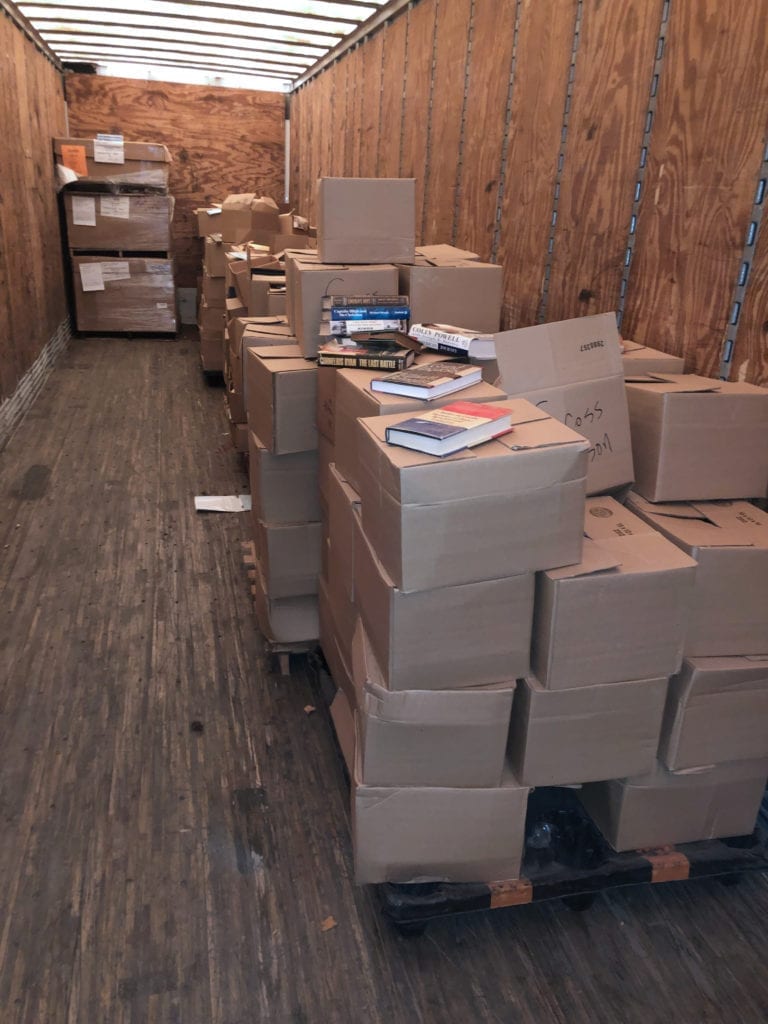
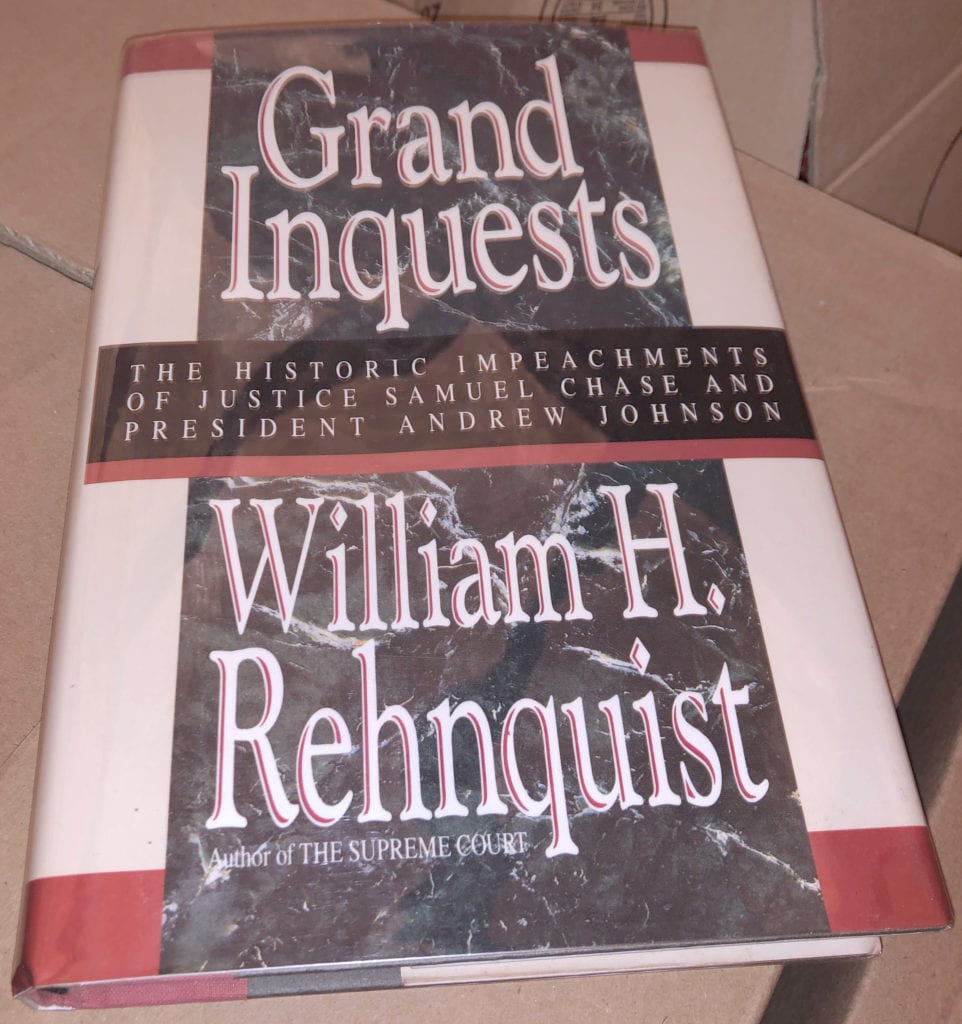


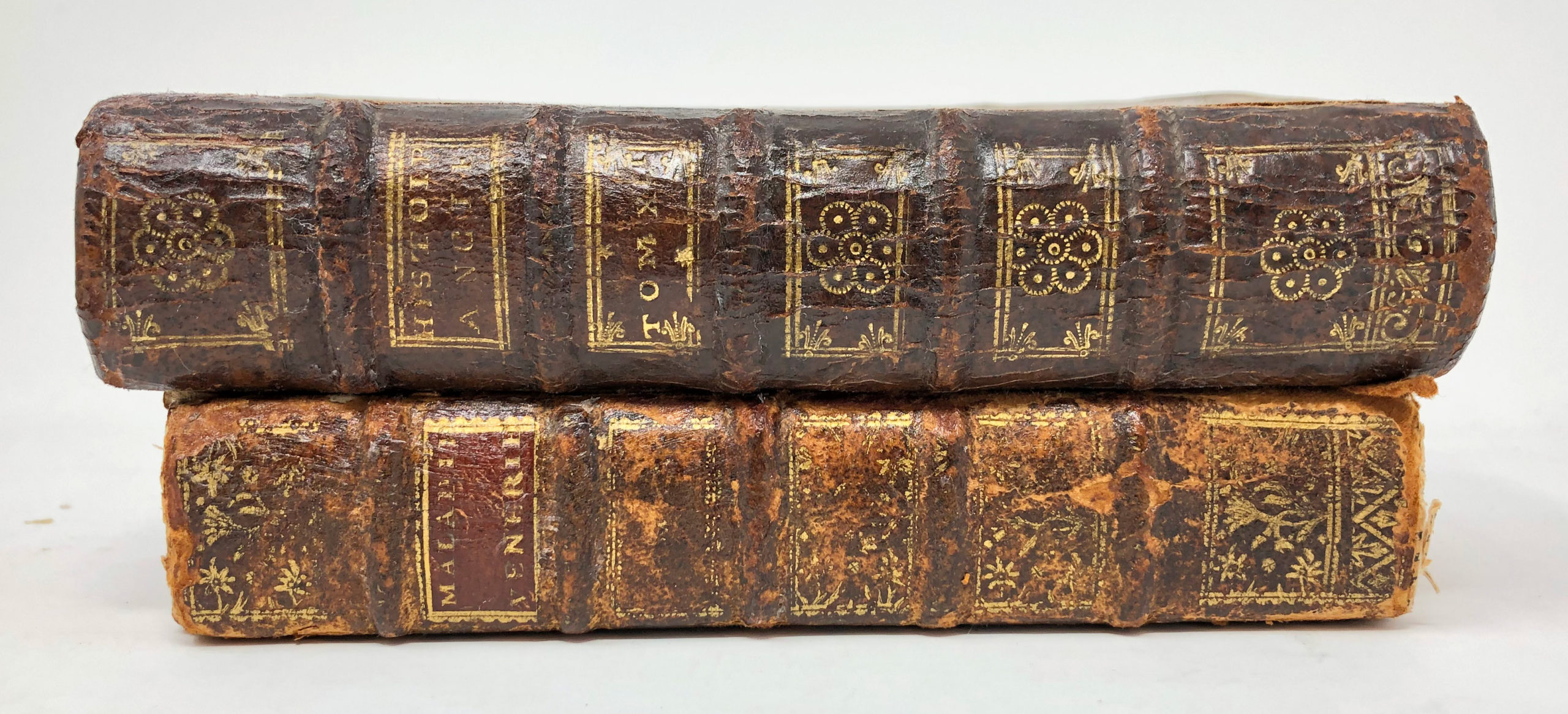
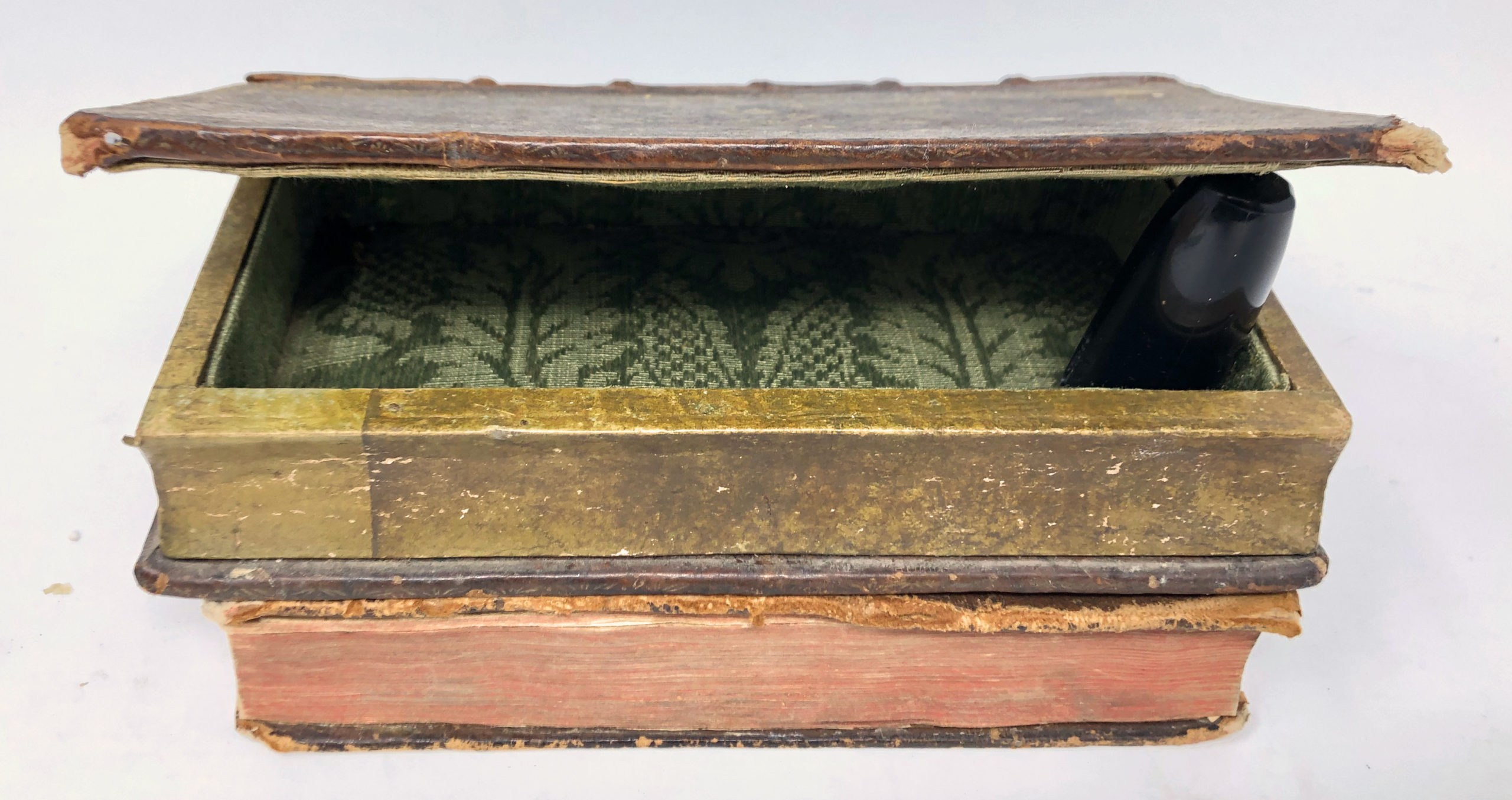
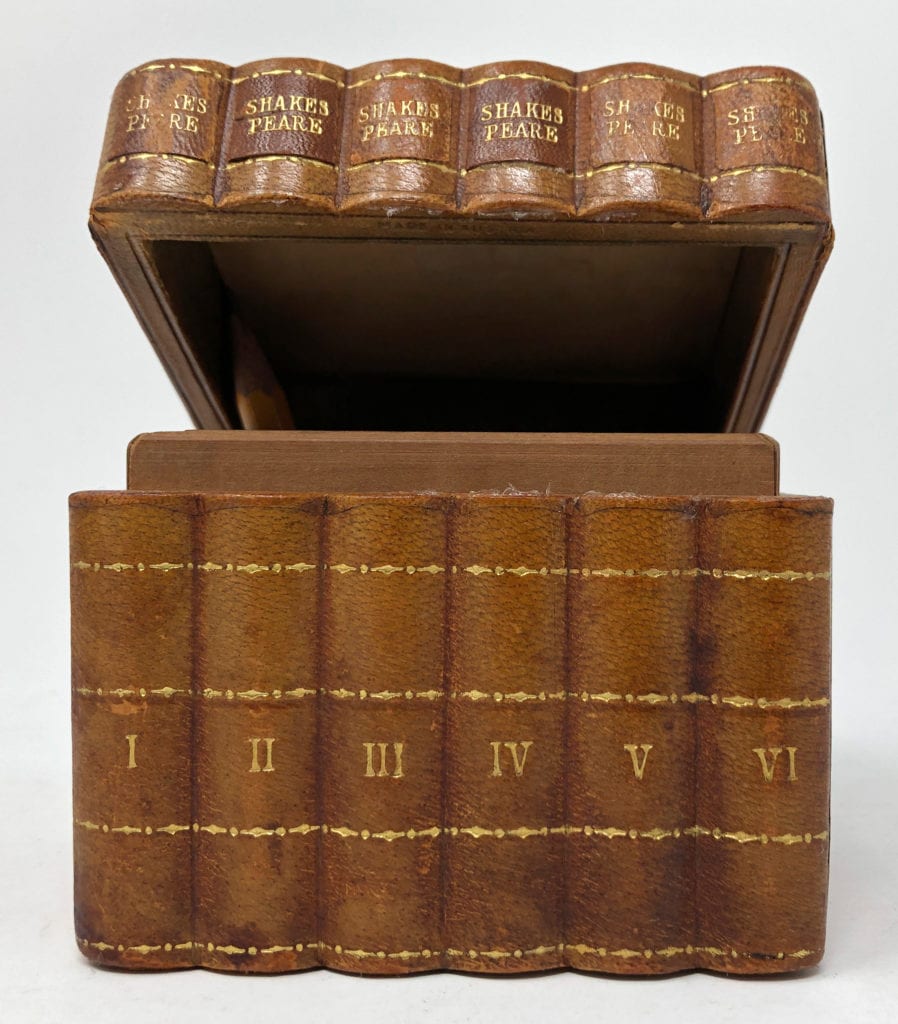
Great stories all…..I enjoy reading about the process of aquisition and dispersement of books and realizing my hoard will only be mine for so long before they fall to another fate in others hands.
Thanks again for sharing your experiences.
Thank you for reading and commenting Mary!
It is heartening when I hear people say they enjoy the stories.
Chuck